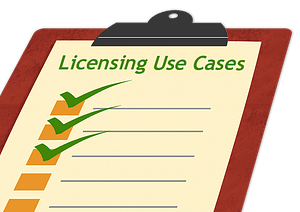Licensing requirement use cases. You’ve made your list, right? You’ve duly documented all of the ways that someone will obtain and interact with your software licenses during the lifetime of their relationship with your company.
What’s that? Not so much, you say?
Yes, we know. It can be tempting to skip this step, with the idea that you can create the list as you go along. But trust us, everything will be better if you’ve written out all the potential use cases for your licensing implementation.
At the start of any type of development or integration project, eliminate ambiguity by fully documenting all licensing use cases and mocking up all desired user interfaces. What type of workflow and end user experience do you want? If you’ve covered all potential use cases up front, the result will be a simple and smooth workflow and UX.
Before the Why, Let’s Talk About What…
So do yourself a big favor by listing out the answers to questions like this:
- What are all of the possible ways customers will purchase licenses to my software?
- An online store with a credit card and automated license delivery
- An offline purchase by another method and manual license delivery
- What are all of the possible ways customers should be able to activate / deactivate / transfer licenses?
- Will there be disconnected users that need to activate and how close is internet access for these users?
- How often should the license be validated with the central licensing server?
- Keep in mind that this decision affects security with license transfers / deactivations and with disconnected users.
- Customer purchases a discounted upgrade from one product build/version/edition to another and tries to install the upgrade on a second computer.
- Should the first computer’s license be deactivated automatically?
- Should the user be able to re-activate the first license on a new computer?
- Customer purchases 3 features from Product A and later wants to come back and add 2 additional features. Can features be split between two computers?
- Should customers with expired software maintenance be able to download minor version updates? Major version updates? For how long after the maintenance expires?
- Should customers be able to purchase software maintenance renewals online?
- What are the pricing rules when their maintenance is current versus expired?
- How long after expiration should they be able to renew before paying a reinstatement fee or being forced to purchase a new license instead.
- I can go on and on, but you get the idea…
Here are the 4 Reasons Why it’s Smart
Skipping the use case brainstorming scenario is likely to bring you the burden of more work in the future. Larger companies that have multiple departments will have diverse needs for each department, and these must be accommodated. Smaller organizations will profit by being ahead of market needs.
And in the process of creating the licensing requirements list, your team becomes a powerfully productive force.
No matter which licensing system you choose or which resources do the actual design and coding, documenting use cases ensures that:
- Your stakeholders can visually see the use cases and provide internal signoff that all necessary requirements have been met.
- The developers can properly implement the requirements.
- The testing team can test all use cases.
- Your staff can perform final acceptance testing and signoff on project completion.
SoftwareKey Can Help With This Process
You may have noticed that some use cases are obvious, while it would take you significant time to come up with some of the others. But no worries – we’re here to help!
The SoftwareKey Professional Service Team is happy to work with you through a discovery process to make sure all use cases have been listed and thought through. We can help you by asking questions and discussing advantages and disadvantages of each licensing approach.
We have been providing licensing services for over two decades and have a lot of experience at your fingertips. The resulting documentation of the discovery project will be useful for any team working on the licensing project, even if it is not us!

